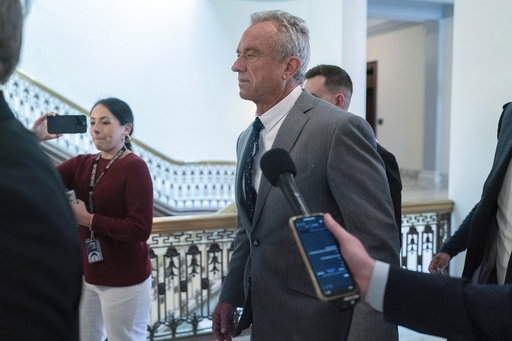
WASHINGTON — In recent years, Dolores Mejia has noticed that the children she encounters around suburban Phoenix appear to be gaining weight, and she has experienced her own struggles with weight. At 75, Mejia finds herself reflecting on Robert F. Kennedy Jr.’s campaign promise of “Make America Healthy Again,” which she heard as he joined Donald Trump in his campaign efforts. Mejia resonated with Kennedy’s focus on the impacts of processed foods on the obesity crisis plaguing America.
“I’m a junk food person,” Mejia confided, identifying with the concerns about where excess weight might come from. After engaging with Kennedy’s ideas, she arrived at the conclusion that the health organizations previously trusted may not guarantee the safety of the food supply. Republican voters like Mejia are rallying behind Kennedy, particularly as he could potentially become the nation’s leading health official next year under Trump’s administration. Recent polls show that Republicans overwhelmingly view Kennedy positively, with a significant majority supporting Trump’s decision to include him in his cabinet.
However, Kennedy’s overall approval rate among Americans appears to be more mixed, with many voters not endorsing his more controversial views, particularly regarding increased scrutiny of vaccines. If appointed by the Senate, he would take the helm of the Department of Health and Human Services, a significant department overseeing a budget of $1.7 trillion that is responsible for various health-related functions, including drug approvals and health insurance for nearly half of the country’s population.
In a recent survey, around 60% of Republicans expressed support for Kennedy’s prospective role in Trump’s Cabinet, whereas only about 10% disapproved. This reflects a stark divide between partisan lines, as many Democrats are less approving of Kennedy, with around 60% expressing strong disapproval of his nomination—higher than the disapproval rates for other notable appointments such as Pete Hegseth for defense secretary.
Kennedy’s past as an environmental attorney winning landmark cases against companies has helped him build a devoted following. However, he has also gained notoriety for his assertions that vaccines recommended by public health agencies are dangerous, despite overwhelming scientific evidence proving their safety and effectiveness.
During an appearance on a podcast earlier this year, Kennedy made sweeping claims regarding vaccine safety and drew connections to discredited theories linking vaccines to autism. While Trump has hinted at the need for further investigation into vaccine connections, this contradicts decades of established research that dismisses such associations. His administration’s promise is rooted in opposing government-mandated vaccination, favoring more research instead.
Public sentiment reveals a desire for more governmental involvement in childhood vaccinations. Approximately half of the voters advocate for increased governmental oversight in vaccination programs. A quarter of respondents feel that the current involvement is adequate, while only about 20% wish for decreased government role, particularly notable among parents of children under 18.
Kennedy, who heads the nonprofit Children’s Health Defense, is currently pursuing legal action against news organizations, including accusations of antitrust violations for addressing misinformation related to COVID-19 vaccines. Though he stepped back from the organization to campaign for president, he remains listed as one of the attorneys in the ongoing case.
Voter sentiments regarding Kennedy remain polarized. Even as he supported Trump following his exit from the presidential race, public opinion remained divided. Roughly 40% of voters viewed him favorably, while another 40% held an unfavorable view. Support for him was notably stronger among Republican voters, with two-thirds holding a positive opinion, contrasting with just around 20% of Democrats expressing similar sentiments. The discontent among Democrats was notably high, with around 70% expressing negative views about Kennedy.
This ongoing discourse highlights a growing awareness of the health challenges faced by Americans and the controversial figures arising in politically Charged environments to address these issues and their implications on public health policies.
